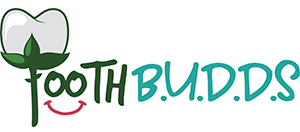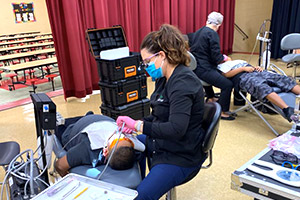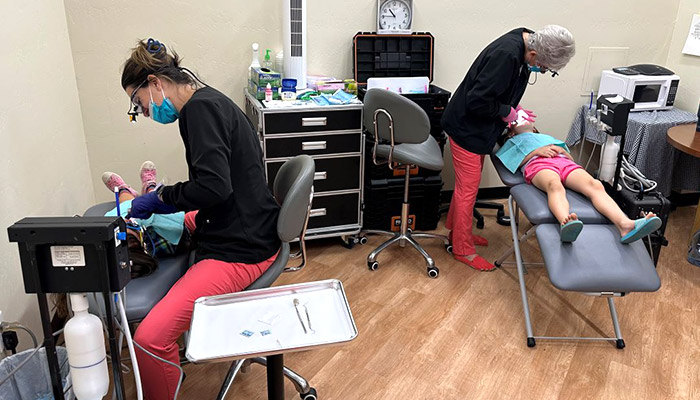Tooth B.U.D.D.S.
- Need: To increase access to preventive dental care among children living in rural Arizona.
- Intervention: A nonprofit organization formed to offer free, school-based preventive dental services to children in two rural Arizona counties.
- Results: Throughout the 2023-24 school year, Tooth B.U.D.D.S. provided preventive services to 1,710 students in rural Graham and Greenlee Counties. Program staff use a telehealth platform to connect children to local dentists for follow-up care.
Description
 Tooth B.U.D.D.S., a 501(c)3
nonprofit, was founded in 2017 by a local dental
hygienist who had recently learned of oral health
disparities affecting children in the rural Gila Valley
region of southern Arizona. At the time, Greenlee County
was home to the highest number of children in the state
reporting that they had not seen a dentist in the past
year. This was due to a shortage of local providers and
the many potential barriers that prevent parents from
travelling long distances to bring their children in for
routine check-ups.
Tooth B.U.D.D.S., a 501(c)3
nonprofit, was founded in 2017 by a local dental
hygienist who had recently learned of oral health
disparities affecting children in the rural Gila Valley
region of southern Arizona. At the time, Greenlee County
was home to the highest number of children in the state
reporting that they had not seen a dentist in the past
year. This was due to a shortage of local providers and
the many potential barriers that prevent parents from
travelling long distances to bring their children in for
routine check-ups.
To help alleviate these challenges, Tooth B.U.D.D.S. partners with schools in Graham and Greenlee Counties to offer free preventive dental services to students. More recently, the organization has begun offering services at schools in urban Maricopa County.
Services are provided by a team of affiliated practice dental hygienists (APDH), who are licensed to provide a wide range of treatments without dentist supervision. APDHs are affiliated with local dentists, to whom they refer students if they identify needs beyond the preventive care they are licensed to provide. Tooth B.U.D.D.S. staff use a telehealth platform to send intra-oral images to local dentists, expediting the diagnostic process and connecting students to streamlined follow-up care.
Tooth B.U.D.D.S. of Graham and Greenlee Counties funding partners include the United Way of Graham and Greenlee Counties, Delta Dental of Arizona Foundation, Arizona Community Foundation, Vitalyst Health Foundation, AZ Complete Health Foundation, Ag West, and the Community Foundation of Southern Arizona.
Services offered
 Every year, Tooth
B.U.D.D.S. visits 14 schools in Graham and Greenlee
Counties, and 10 schools in Maricopa County. Providers
visit each classroom in each participating school to
offer Oral Hygiene Education (OHE) and distribute
parental consent/medical history forms. Later, after the
forms are completed, providers return to the schools with
equipment to offer full-scope preventive care, including:
Every year, Tooth
B.U.D.D.S. visits 14 schools in Graham and Greenlee
Counties, and 10 schools in Maricopa County. Providers
visit each classroom in each participating school to
offer Oral Hygiene Education (OHE) and distribute
parental consent/medical history forms. Later, after the
forms are completed, providers return to the schools with
equipment to offer full-scope preventive care, including:
- Screenings for cavities and other oral health issues
- Dental cleanings
- Sealants to help prevent cavities
- Fluoride varnish to strengthen teeth
- Silver diamine fluoride to stop cavities from progressing
- Silver modified atraumatic restorative therapy (SMART) restorations
- Use of telehealth technology to share intra-oral images with local dentists
- Referrals to local dentists for streamlined follow-up care
Services are available to all students.
Results

Throughout the 2023-2024 school year, Tooth B.U.D.D.S. taught OHE to 3,972 students in Graham and Greenlee Counties. 1,710 students received preventive dental services. Tooth B.U.D.D.S. providers placed 11,922 sealants and identified 2,475 individual teeth with an active cavity. 37% of children seen had active tooth decay. Tooth B.U.D.D.S. estimates the total value of all services provided in Graham and Greenlee counties throughout 2023-2024 to be $795,401.
In addition to offering preventive services and referrals, Tooth B.U.D.D.S. providers have also identified and reported signs of physical abuse, sexual abuse, and malnourishment in children. Program leadership note that oral examinations can be an essential tool for identifying and helping abused children because “the mouth is often the first avenue for abuse.”
Soon after the organization was formed, Tooth B.U.D.D.S. leadership heard from a counselor at a local juvenile detention center. The counselor shared that they had spoken to many young people who said that they had first turned to drugs to self-medicate for a toothache. In response, Tooth B.U.D.D.S. adopted the following vision statement: "... Because no child should turn to drugs because of a toothache!"
The program has received the following awards and recognition:
- El Rio/Wright Center Virtual Health Research Fair Create Tomorrow Award
- Arizona Dental Hygiene Association Unique Access to Care Award
- New York State Dental Conference 2019 Teledentistry Innovation Award
In 2020, Tooth B.U.D.D.S. was featured in the National Rural Health Association's Compendium of Rural Oral Health Best Practices.
Challenges
Financial sustainability is an ongoing challenge. Funders are often eager to support new initiatives, and programs may struggle to find ongoing funding as they age. Currently, Tooth B.U.D.D.S. leadership are exploring pathways to allow for the reimbursement of APDH services by private insurance companies.
Replication
In many rural areas, the need for additional oral health services for children is dire. Once you take the initial steps to start a program, unexpected doors will open and additional resources will emerge. Tooth B.U.D.D.S. leadership is happy to speak with anyone interested in starting a similar program elsewhere in the country.
Contact Information
MiQuel McRae, RDH, AP, Founder/Executive DirectorTooth B.U.D.D.S.
928.965.1534
miquel@toothbudds.org
Topics
Access
· Children and youth
· Dental workforce
· Mobile and episodic healthcare delivery
· Oral health
· Schools
States served
Arizona
Date added
July 25, 2024
Suggested citation: Rural Health Information Hub, 2024 . Tooth B.U.D.D.S. [online]. Rural Health Information Hub. Available at: https://www.ruralhealthinfo.org/project-examples/1143 [Accessed 7 January 2026]
Please contact the models and innovations contact directly for the most complete and current information about this program. Summaries of models and innovations are provided by RHIhub for your convenience. The programs described are not endorsed by RHIhub or by the Federal Office of Rural Health Policy. Each rural community should consider whether a particular project or approach is a good match for their community’s needs and capacity. While it is sometimes possible to adapt program components to match your resources, keep in mind that changes to the program design may impact results.
